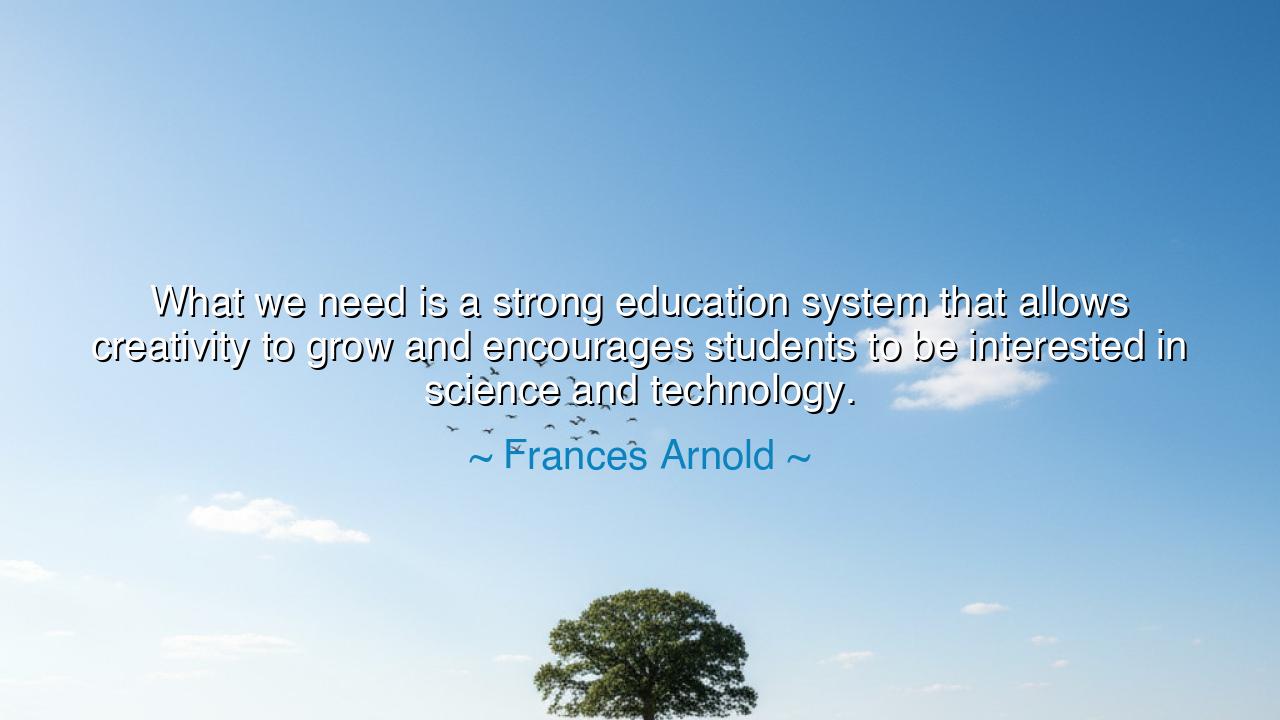
What we need is a strong education system that allows creativity
What we need is a strong education system that allows creativity to grow and encourages students to be interested in science and technology.






Frances Arnold, Nobel laureate in chemistry and pioneer of directed evolution, once declared with wisdom born of experience: “What we need is a strong education system that allows creativity to grow and encourages students to be interested in science and technology.” In this declaration, she speaks not merely of classrooms and textbooks, but of the lifeblood of civilization itself. For education is the root from which all progress springs, and if that root is withered, the tree of society cannot bear fruit. Arnold calls us to build a system that does not stifle, but liberates; that does not smother imagination, but gives it wings.
The origin of this truth lies in Arnold’s own journey. She began not as a prodigy, but as a dreamer and doer who dared to cross disciplines, who combined imagination with rigor until she created new ways of engineering life itself. She knew firsthand that science and technology are not dry pursuits, but adventures of the mind—quests that require both creativity and courage. Her words echo with the conviction that the education system must not be a cage of memorization, but a forge where curiosity and invention are made strong.
History has proven this again and again. Consider the Renaissance, when education shifted from rote scholasticism to a celebration of discovery, art, and inquiry. In that age, Leonardo da Vinci, raised not as a scholar of universities but as an apprentice with freedom to explore, blended creativity with mechanical curiosity, giving birth to designs centuries ahead of his time. Had his education been only rigid repetition, the notebooks that astonish us today might never have been written. Creativity and science together gave light to the world.
We see the same lesson in the life of Marie Curie. In a time when women were often denied education, she fought her way into laboratories and lecture halls, guided by a fierce hunger for knowledge. Her discoveries of radioactivity reshaped physics and medicine. But what gave her strength was not obedience to a narrow system—it was the courage to question, to experiment, to imagine what others thought impossible. Her life testifies to Arnold’s truth: when education nurtures curiosity instead of crushing it, students can change the course of history.
The meaning of Arnold’s words is thus both urgent and noble. A strong education system must prepare students not merely to pass examinations, but to solve problems that do not yet exist, to imagine solutions no one has yet seen. Creativity is not the enemy of science—it is its twin, its breath, its fire. To separate them is to cripple progress; to unite them is to unleash the power of human potential. Science without creativity becomes stagnant; creativity without knowledge becomes aimless. Together, they are the builders of tomorrow.
The lesson for us is clear: if we would see future generations thrive, we must guard and strengthen the foundations of education. We must encourage children not only to remember, but to wonder. We must teach them not only to answer, but to ask. We must show them that science and technology are not dry walls of equations, but gateways to understanding the stars, the oceans, and even the code of life itself. For the future belongs not to those who merely repeat what is known, but to those who dare to create what is new.
Practical steps are within reach. Support schools that invest in laboratories, in libraries, in teachers who inspire as well as instruct. Encourage young people to build, to tinker, to code, to question. Parents, nurture curiosity at home—answer questions with patience, or seek answers together. Leaders, craft policies that fund education as the highest investment of the state, for it is the seed of prosperity and the guardian of freedom. And each of us, in our own way, must treat learning not as a task to be endured, but as a gift to be treasured.
So let Frances Arnold’s words echo as a call to every generation: “A strong education system that allows creativity to grow and encourages students to be interested in science and technology.” This is not a luxury, but a necessity. For in the strength of our schools lies the strength of our nations, and in the minds of our children lies the destiny of the world. Nurture them well, and they will create wonders yet unimagined. Neglect them, and the future will crumble into silence. Choose, then, to build the education that builds humanity.






AAdministratorAdministrator
Welcome, honored guests. Please leave a comment, we will respond soon